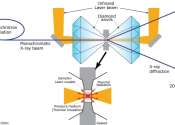Scientists lead study of galaxy's 'water worlds'
Astrophysical observations have shown that Neptune-like water-rich exoplanets are common in our galaxy. These "water worlds" are believed to be covered with a thick layer of water, hundreds to thousands of miles deep, above ...









